Session 2a: Institute for the Advancement of Inquiry (Blanchelande College)
Home › Forums › FOSIL Presentations › 2025 FOSIL Symposium › Session 2a: Institute for the Advancement of Inquiry (Blanchelande College)
- This topic has 4 replies, 2 voices, and was last updated 11 months, 4 weeks ago by
 Darryl Toerien.
Darryl Toerien.
-
AuthorPosts
-
10th February 2025 at 1:57 am #85469
Post here for questions and comments on:
10:15 – 10:55 | FOSIL Developments | Darryl Toerien, Head of Inquiry-Based Learning at Blanchelande College, and originator of FOSIL and the FOSIL Group
Institute for the Advancement of Inquiry (IAI)
- 00:00 Founding the Institute | Darryl Toerien
- 14:34 Symbolising the Institute | Darryl Toerien, Jenny Toerien, Librarian and Projects Co-ordinator at Blanchelande College, & Lara Stanford, Year 13 student at Blanchelande College
- 25:05 Integrating and hosting the Institute | Jane Grange, Director of Studies at Blanchelande College, and Alexa Yeoman, Principal of Blanchelande College
- 32:02 Valuing the Institute | Mark Le Page, Managing Director of Orthoginian Limited and former Deputy Director of the Guernsey Financial Services Commission
—
Links to PowerPoint presentation and YouTube recording (timestamps for individual sections given above)
—
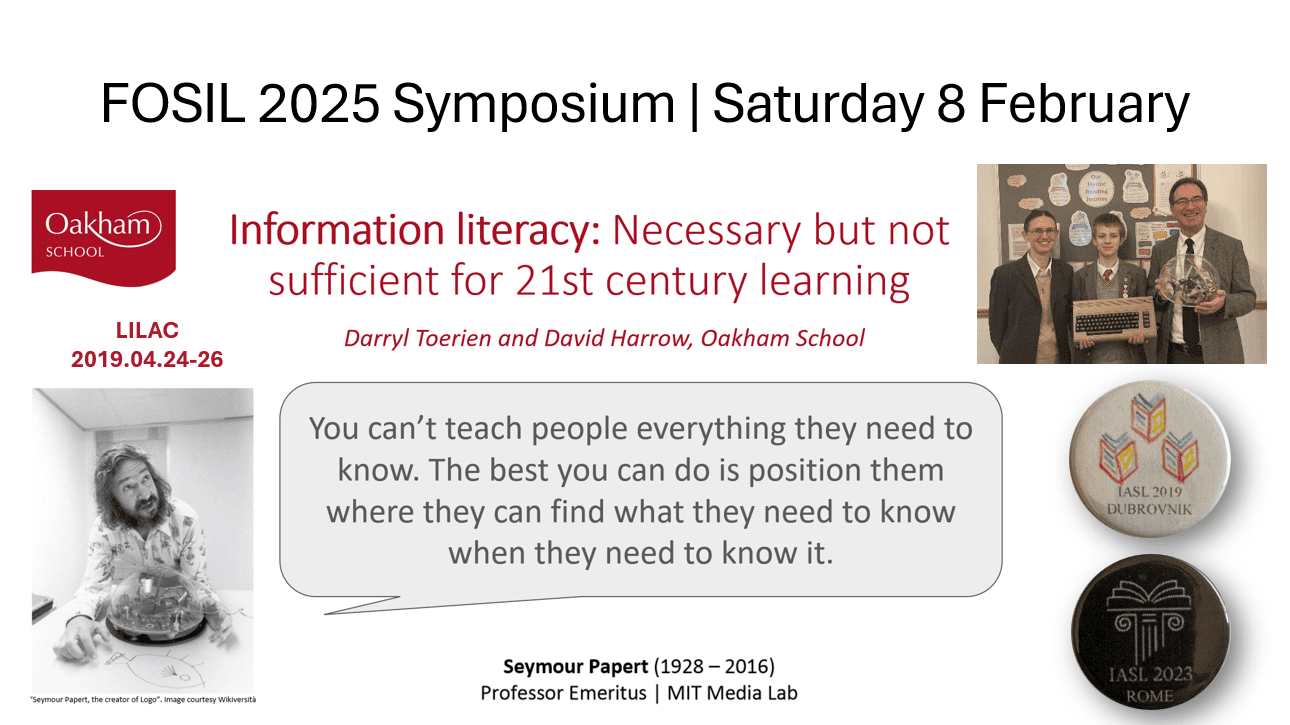 10th February 2025 at 2:54 pm #85486
10th February 2025 at 2:54 pm #85486Founding the Institute by Darryl Toerien
This brings me to the second major FOSIL development, which is the foundation of the [school-based] Institute for the Advancement of Inquiry [in PK-12 education].
Jonathan Rauch, in The Constitution of Knowledge: A Defense of Truth (2021), highlights how our existential crisis is epistemological in nature – a breakdown in the knowledge-building process, which is the inquiry process. The Constitution of Knowledge – liberal democracy’s “epistemic operating system: our social rules for turning disagreement into knowledge” – depends on the vitality of a “reality-based community of error-seeking inquirers” (p. 15). This community has been severely weakened by the almost total failure of schools to equip students for their role in strengthening this community, a failure to enable inquiry as a method of instruction and an environment for formalised learning in PK-12 education. And it is precisely because school “is the one institution in our society that is inflicted on [almost] everybody,” that Neil Postman and Charles Weingartner (1969/ 1971) forewarned that “what happens in school makes a difference – for good or ill” (p. 12).
As today demonstrates, concern with these questions, and responses worthy of our serious consideration, is broader than FOSIL. This is healthy, and is the rationale for the Institute for the Advancement of Inquiry, which is to support and provoke thoughtful effort to enable inquiry as a method of instruction and an environment for formalised learning in PK-12 education regardless of model, and this for the purpose of developing a reality-based community of engaged and empowered inquirers.
The Institute has been incorporated in these terms:
The purpose of the Institute is to initiate and support efforts, formal and informal, that foster the development of school-age children as engaged and empowered inquirers. This both enables them to fulfil the deepest potentialities of their being human in the world, and strengthens the liberal-democratic fabric of society.
To this end, the Institute will collaborate with partners who are aligned with its purpose, both in terms of research into and development of inquiry as a method of instruction and an environment for formalised learning, and in terms of funding. The Institute will provide a public service to educators that is free at the point of need, but it is anticipated that additional funding will come from consultancy engagements and standalone training events.
The Institute has been established with the assistance of Mark Le Page, who is joined on the Board by Barbara Stripling, Dianne Oberg and Luisa Marquardt, Professor at Roma Tre University and Chair of the IFLA School Libraries Section.
—
Symbolizing the Institute by Lara Stanford (Year 13 / Grade 12 Student at Blanchelande College)
Please note that there are two minor adjustments to the logo that need to be before it is finalized.
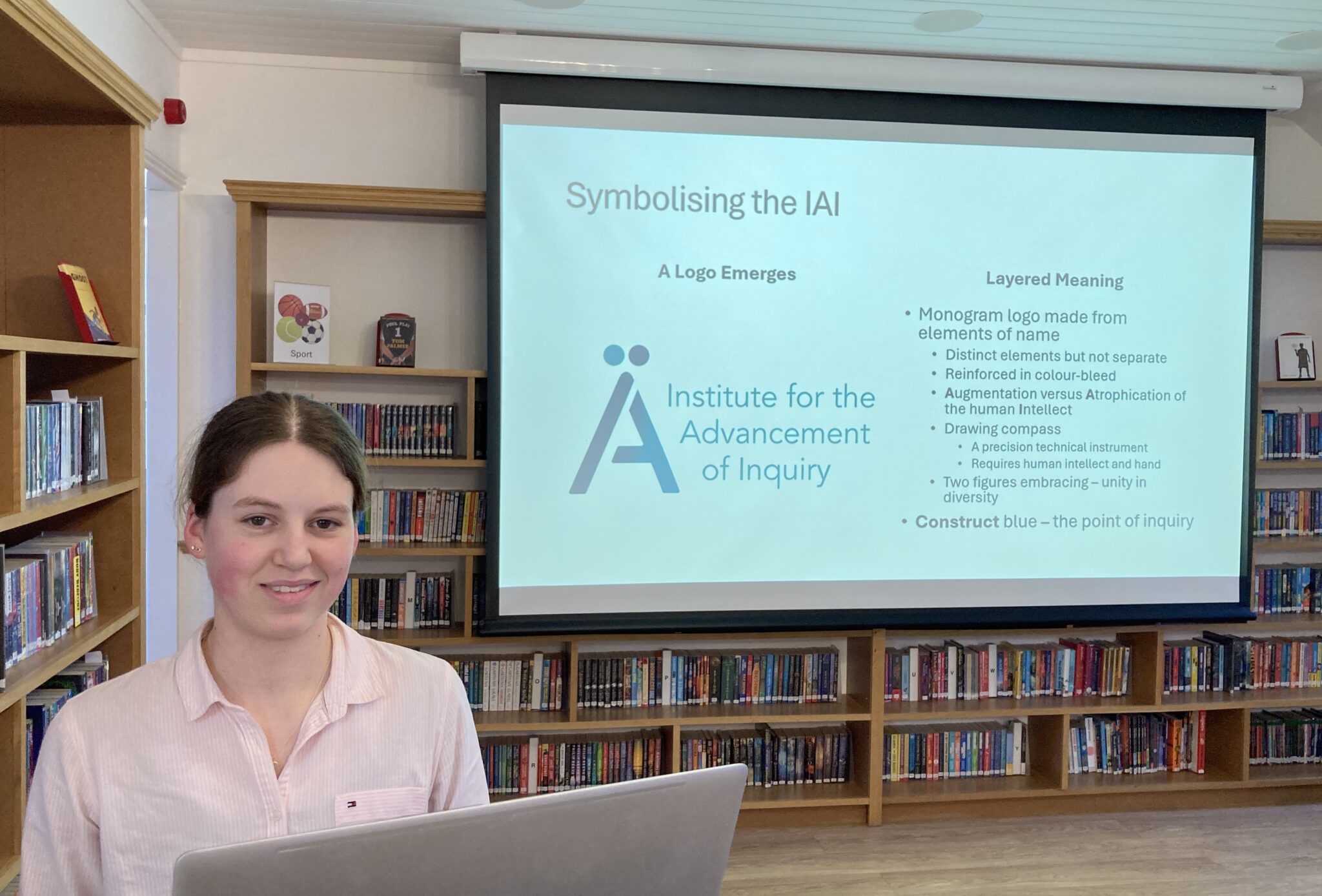
Within the broader context of the relationship between humans and their machines, each letter in this monogram logo – the IAI – is distinct, but not separate, reflecting the fact that inquiry cannot be meaningfully separated from digital age tools within a digital environment.
This dynamic relationship is reinforced with the colour gradient between the letters.
It therefore also reflects the tension between augmenting human intelligence and the atrophication of human intellect through the misuse of digital-age tools, such as Artificial Intelligence, threatening to replace the need for inquiry and learning altogether.
It can also be interpreted as two figures embracing.
This reflects the principle of ‘unity in diversity’, an ancient phrase expressing harmony and unity between individuals. This relates to the Institute as it aims to be a forum for collaboration and sharing different ideas amongst educators of all kinds, with the shared intent to advance inquiry for students and their ability to pursue learning on their own, using a wide range of digital-age tools to augment human intelligence rather than to diminish it.
After designing the logo and reflecting on it, we discovered that the shape of this logo could also signify a drawing compass, which is a precision instrument for technical use, requiring both human mind and body. This seems fitting because it illustrates the purposeful use of human tools to serve human ends.
Finally, on our choice of colour. Blue has significant symbolism as it represents a critical stage of the FOSIL inquiry cycle – the Construct stage. This is where knowledge is transformed into understanding, and students develop their own ideas based on their investigation and the evidence they have found. It seemed fitting, therefore, that Construct blue would be the colour for the face of the institute, knowing that, as Jacques Maritain stated, “nothing is more important than the events which occur within that invisible universe which is the mind of [a person], the light of which is knowledge.”
—
Integrating the Institute by Jane Grange
Here at Blanchelande College, inquiry is not just a teaching method—it’s a culture. By integrating the work of the Institute for the Advancement of Inquiry, we aim to create a reality-based community of engaged and empowered learners. As Darryl has noted, this requires purposeful collaboration between classroom teachers and library-based educators, ensuring inquiry is embedded throughout the curriculum.
A key feature of integrating inquiry into our practical approach is Signature Work—structured inquiry projects that equip students with essential skills at key developmental stages. Our youngest learners in Years 1 and 2 begin with inquiries such as Why visit Guernsey? and Who lives on Herm?, fostering curiosity and community engagement. By Year 6, students undertake an interdisciplinary inquiry, which spans Theology, Science, English, Art, Maths, and ICT, earning them a CREST Bronze Award and empowering them to campaign for causes they care about. Last year, they raised over £570 and even inspired the Lieutenant Governor to plant a tree at our school. This year, we’re strengthening these community connections by inviting local charities to engage directly with students.
In the upper years, inquiry deepens. Year 9’s Signature Work, now a timetabled subject, develops speaking and research skills for their GCSE English assessment, while Year 12’s Interrobang!? project introduces them to AI and inquiry-based learning, often leading to the Extended Project Qualification (EPQ). These qualifications challenge students across all abilities—whether they are researching humanitarian issues in Syria or designing a drone.
Beyond set projects, inquiry is being embedded across subjects—Maths, Geography, English, Business Studies, and beyond—while our new Scholars’ Society provides the most able students with an inquiry approach to externally-focused opportunities, including national competitions and the TeenTech Awards.
Through these initiatives, we are not only advancing inquiry learning but fostering critical thinking, creativity, and community engagement—empowering students to become independent learners and active citizens. We look forward to the further collaborative opportunities and outward looking inquiries that the Institute will bring.
—
Hosting the Institute by Alexa Yeoman
Blanchelande College has educational roots in Guernsey that reach back to the 1100s. This centuries-long commitment to enabling children to realise their full potential as human beings is reflected in our Mission and our Aims. Drawing nourishment from this rich tradition does not trap us in the past. Rather, an education in this tradition has as its end students who can think in a genuinely free and liberating manner, using the full range of tools at their disposal, which is the hallmark of a contemporary liberal education at Blanchelande.
In FOSIL, we have we have a powerful tool for developing engaged and empowered inquirers, students who are willing and increasingly able to learn for themselves, which is the surest way to equip them for their future.
In the FOSIL Group we belong to a growing international community of exceptionally dedicated and thoughtful educators who are using FOSIL to engage and empower students as inquirers, as today clearly demonstrates, and we are proud to play a central role in this.
In the Institute for the Advancement of Inquiry, we recognise the outstanding efforts of a wider, international community of engaged and empowered inquirers, and are honoured to be able to facilitate this collaborative work.
—
Valuing the Institute by Mark Le Page
Mark referenced a BBC interview with Bertand Russell, which is developed more fully below.
In April of 1959 the British philosopher and mathematician Bertrand Russell sat down with John Freeman of the BBC program Face to Face for a brief but wide-ranging and candid interview. … In answering the question [of what message he would offer to people living a thousand years hence], Russell balances the two great spheres that occupied his life.
“I should like to say two things, one intellectual and one moral:
The intellectual thing I should want to say to them is this: When you are studying any matter or considering any philosophy, ask yourself only what are the facts and what is the truth that the facts bear out. Never let yourself be diverted either by what you wish to believe or by what you think would have beneficent social effects if it were believed, but look only and solely at what are the facts. That is the intellectual thing that I should wish to say.
{This is the intellectual dimension of inquiry, and pertains to the first part of our definition of inquiry as “a stance of wonder and puzzlement that gives rise to a dynamic process of coming to know and understand the world and ourselves in it….“}
The moral thing I should wish to say to them is very simple. I should say: Love is wise, hatred is foolish. In this world, which is getting more and more closely interconnected, we have to learn to tolerate each other. We have to learn to put up with the fact that some people say things that we don’t like. We can only live together in that way, and if we are to live together and not die together we must learn a kind of charity and a kind of tolerance which is absolutely vital to the continuation of human life on this planet.”
{This is the moral dimension of inquiry, which is the outworking of the intellectual dimension, in that knowledge and understanding of things as they actually are – reality – is necessary if we are to deal with things as they actually are, which is the only true measure of success, and pertains to the second part of our definition of inquiry: “…as the basis of responsible participation in community.”}
These two things lead to the third, which is the international nature of the Institute, which makes Guernsey ideal as its base.
11th February 2025 at 10:00 am #85521Endorsing the Institute
The foundation of the Institute for the Advancement of Inquiry – the purpose of which is to initiate and support efforts, formal and informal, that foster the development of school-age children as engaged and empowered inquirers, which both enables them to fulfil the deepest potentialities of their being human in the world, and strengthens the liberal-democratic fabric of society – is clearly necessary and urgent.
This is evident from the extraordinary interest in and contribution to the FOSIL Symposium, which was not limited in focus to FOSIL.
It is also evident in the heartening endorsements of the Institute that I have already received, which I include below in chronological order.
—
Dr Barbara Stripling, Professor Emerita at Syracuse University | School of Information Studies first helped me to set this work in motion more than a year ago (23 January 2024):
I wholeheartedly support the establishment of an institute to support the school library field in developing inquiry-based libraries and schools. The reasons for creating a culture of inquiry in every school are numerous, but they all revolve around the essential core – the empowerment of young people to follow their own sense of wonder, navigate the world, and pursue their own paths of learning.
School librarians across the world are grappling with the complexities of transforming their libraries and schools into centers of inquiry. An online institute would provide open access to relevant research, practical strategies, success stories, adaptable models and frameworks, professional development, and a network of colleagues who are engaged in this important work. An online institute would also provide an incubator for new ideas and planning for the future.
I would be honored to collaborate with Darryl Toerien in developing and contributing to an inquiry institute.
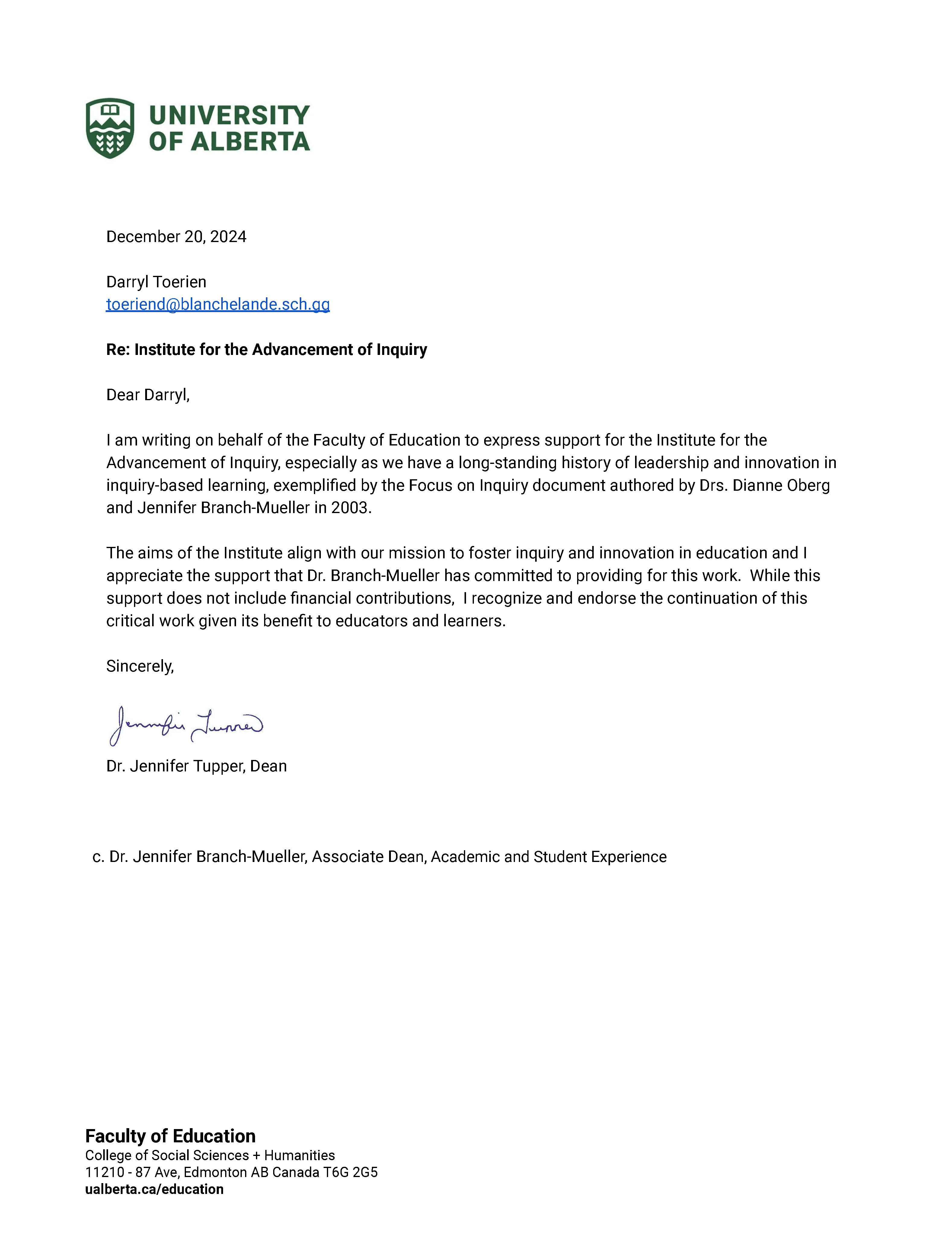
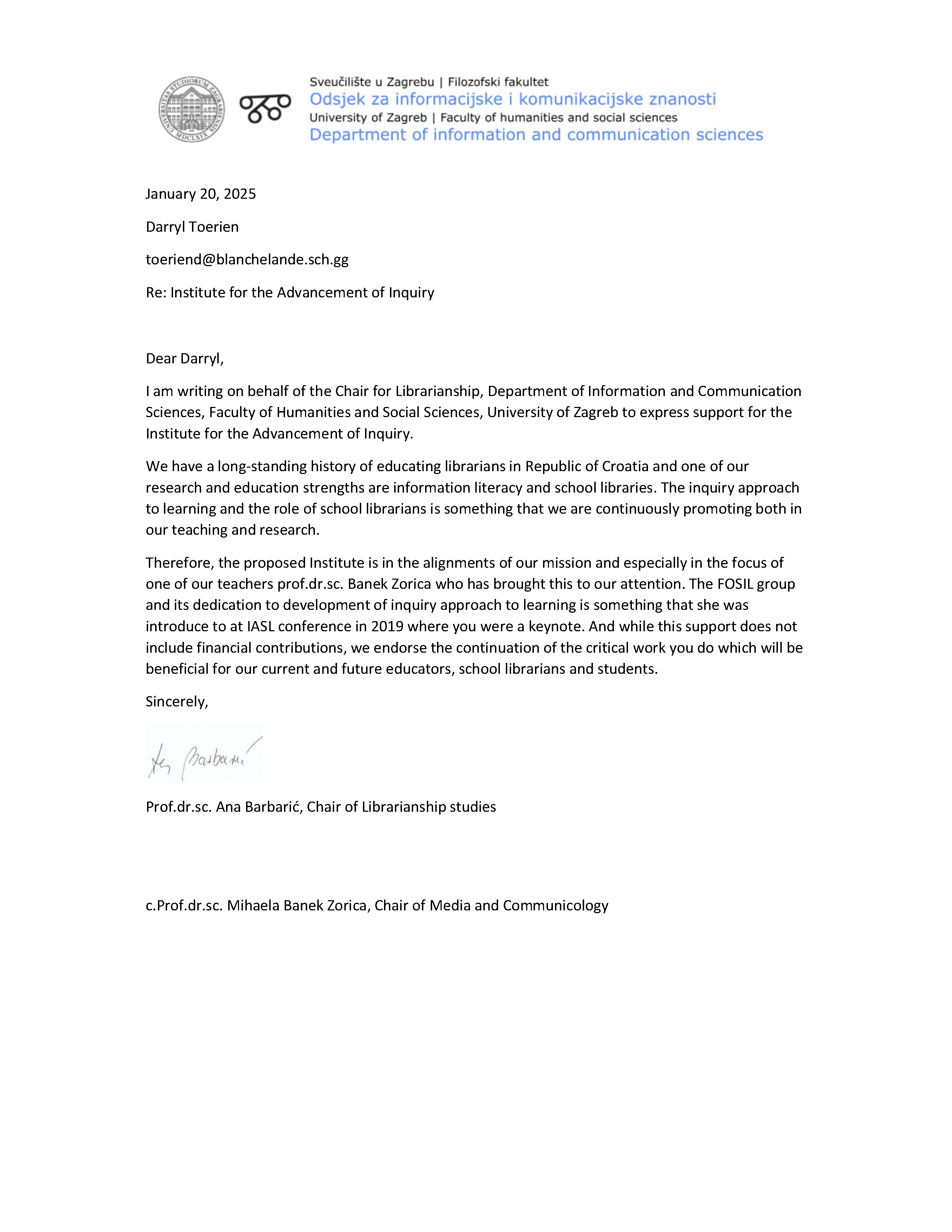
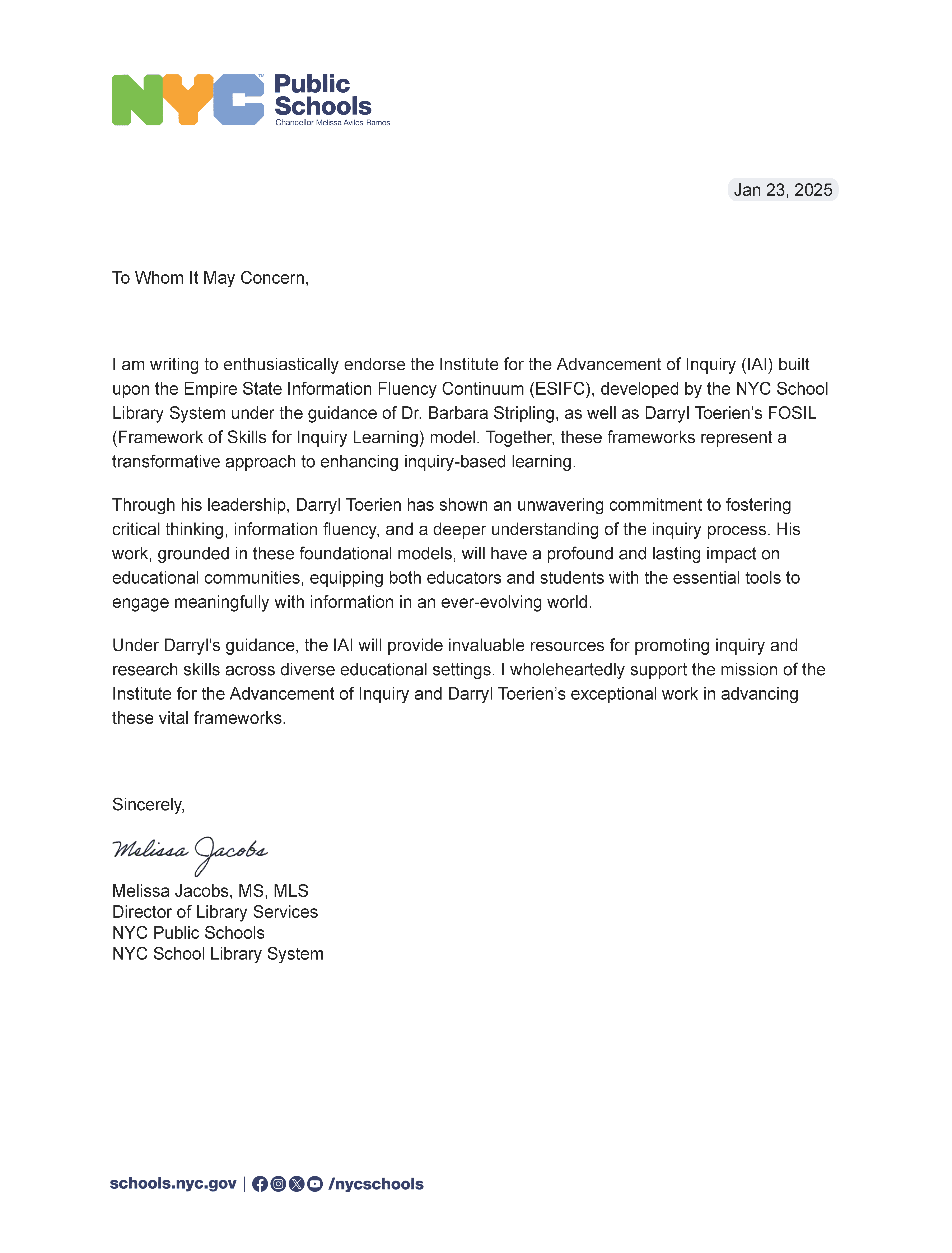
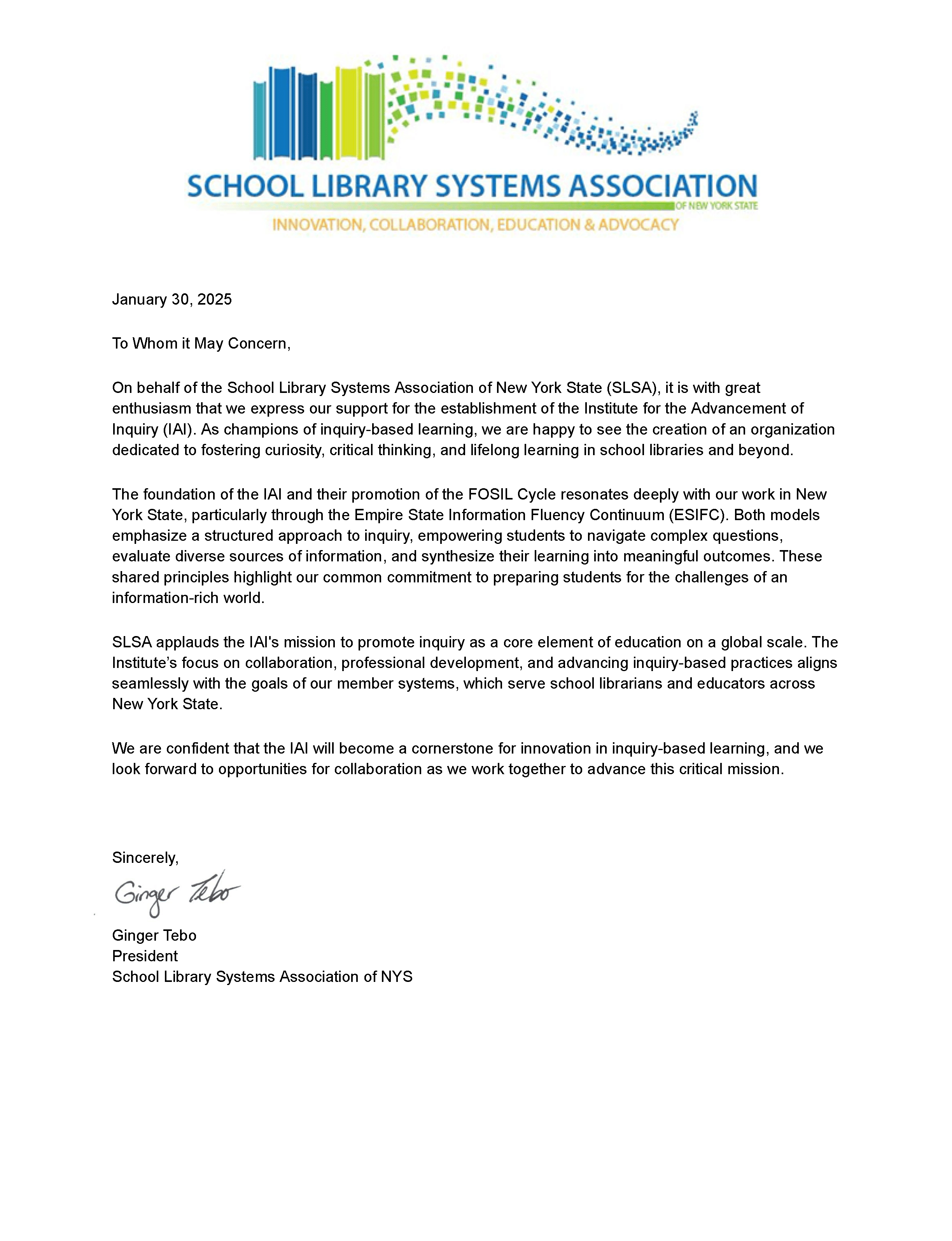
Pending Endorsements
- Dr David Loertscher, Professor at San Jose State University | School of Information
- Dr Luisa Marquardt, Professor at Roma Tre University | Department of Education Science and Chair of the School Libraries Section | IFLA
12th February 2025 at 1:36 pm #85738Endorsements received from Dr Luisa Marquardt, Professor at Roma Tre University | Department of Education and Chair of the School Libraries Section | IFLA
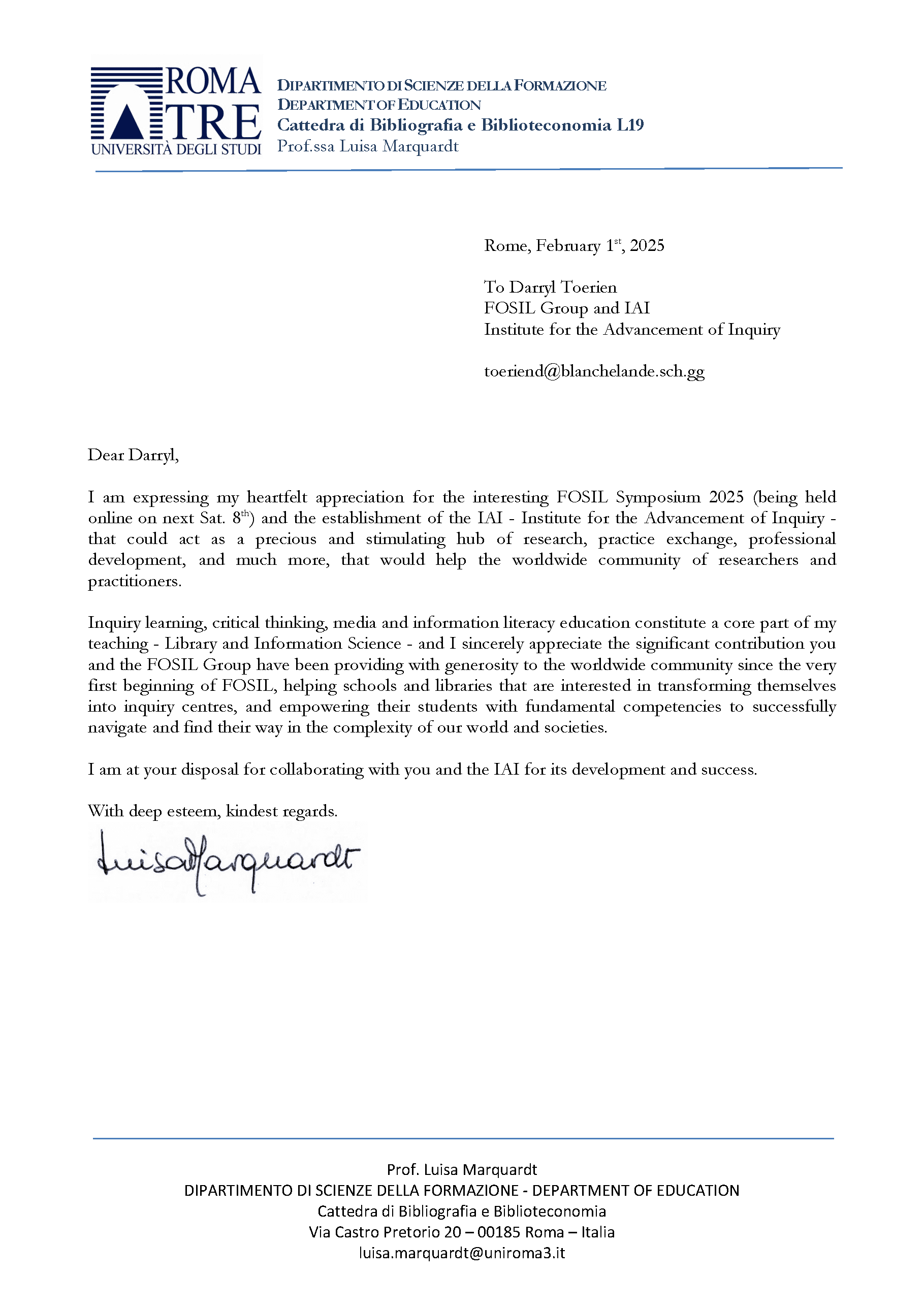
—
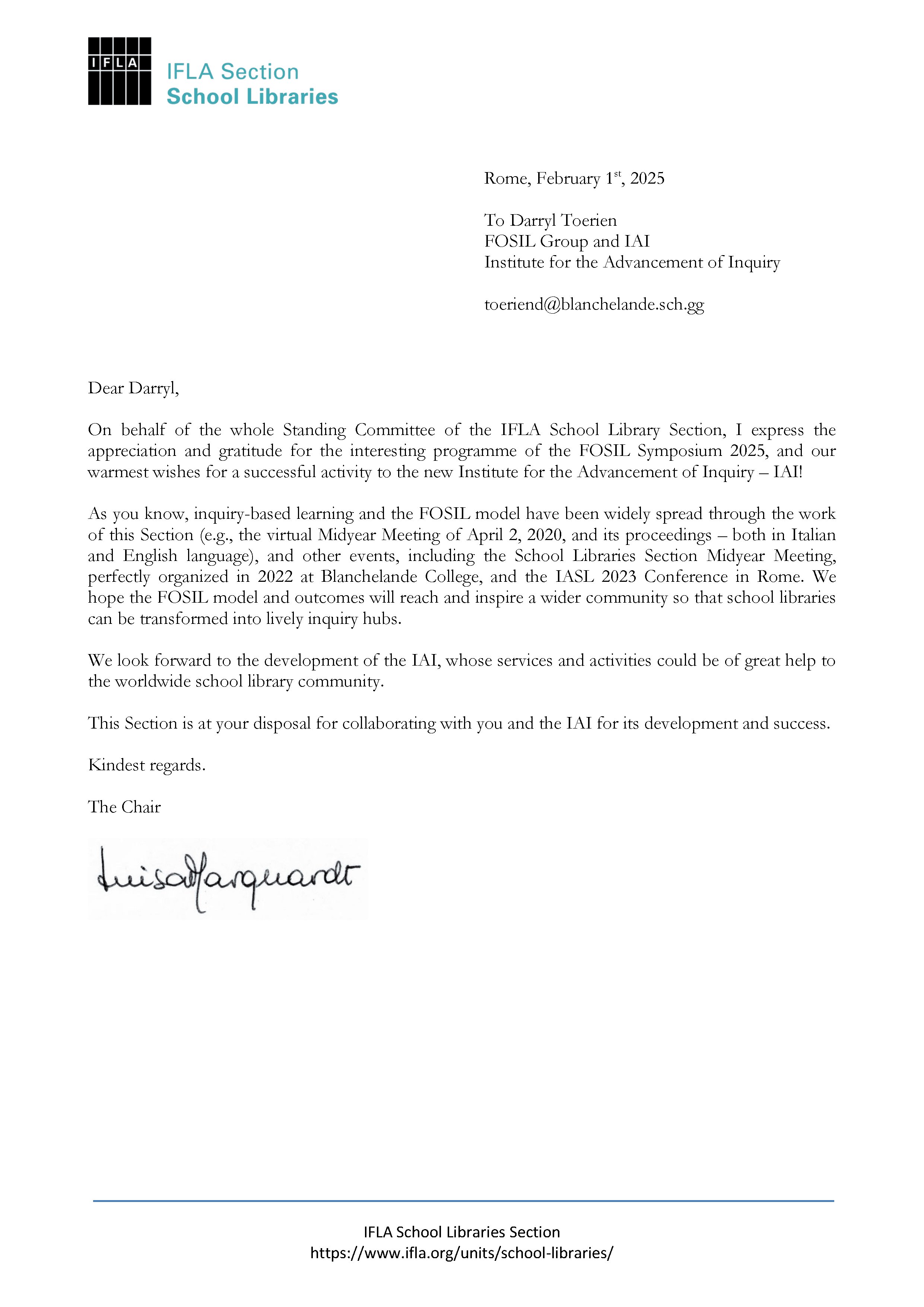 27th February 2025 at 3:25 pm #85660
27th February 2025 at 3:25 pm #85660Endorsement received from Dr David Loertscher, Professor at San Jose State University | School of Information.
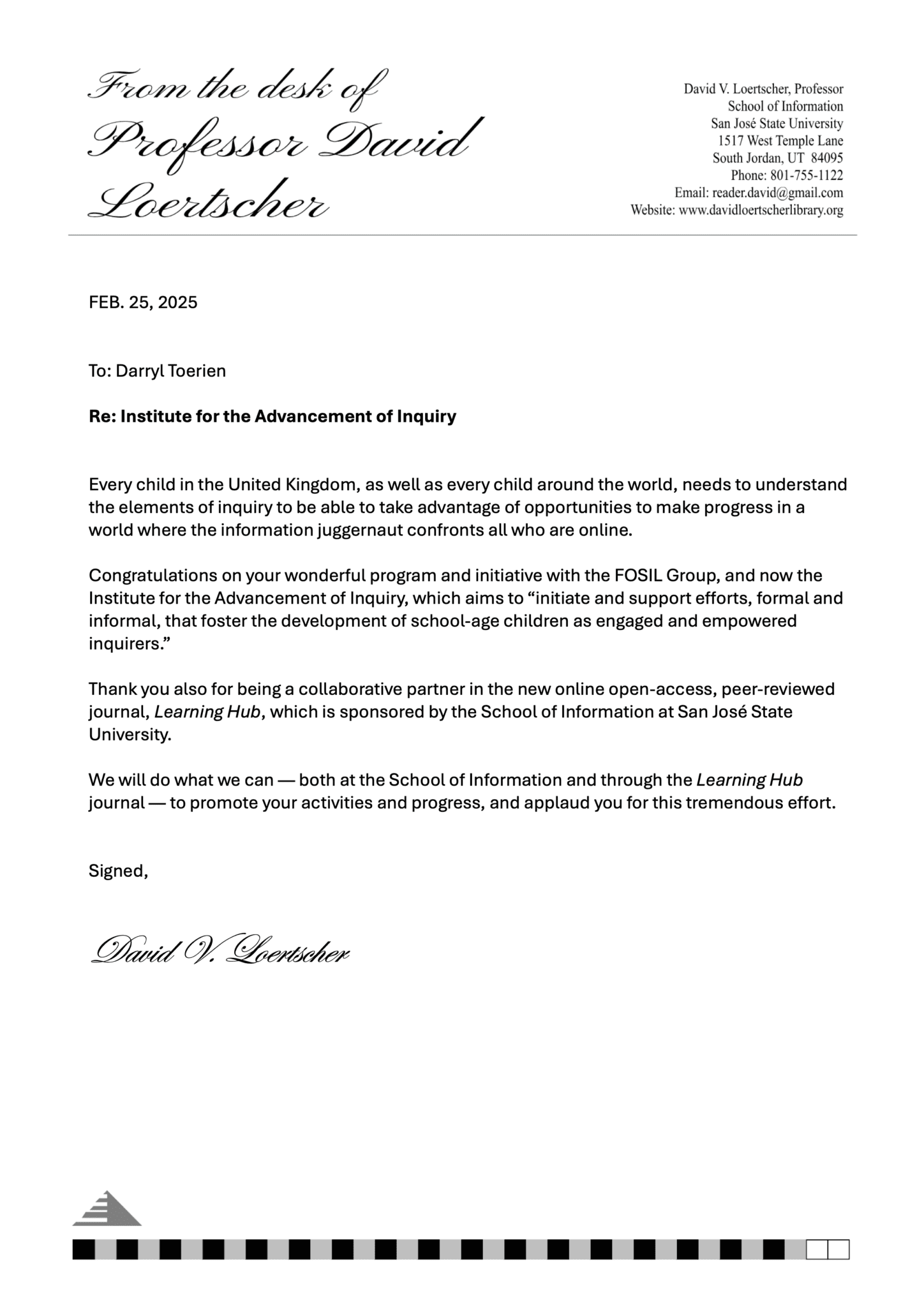
-
AuthorPosts
- You must be logged in to reply to this topic.


